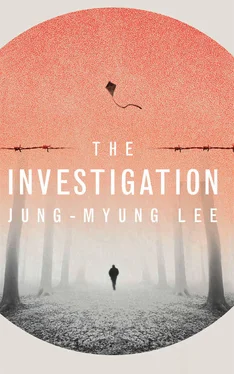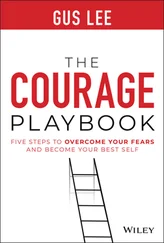The heavy doors to the interrogation room opened and Choi walked in. His sunken, glinting eyes glanced at my shoulder, at my new, stiff badge. ‘Congratulations. I see you’ve got yourself a promotion.’
I was embarrassed. I’d got my corporal’s badge by making him out to be the murderer.
‘Well,’ he said, noticing my discomfort. ‘People who will die should die, and those who survive should live well. Get a promotion, go on leave.’ He sat himself on the chair, looking tired and anxious.
I felt warm. I unfastened a button on my uniform top. ‘I have a few more questions about Hiranuma Tochu.’
‘Him again?’ he snapped. ‘That man’s a different breed. I don’t want to get involved in any way.’ His eyes flickered.
‘You’re right. Hiranuma is very different from you. I know why you and your men kept going to solitary. Why did he?’
Choi rubbed his beard. ‘How am I supposed to know? Why don’t you ask him?’
I had to trip him up. ‘You’re lying. Or you’re not telling me the whole truth. I know your men beat him up when he got out of solitary.’
‘How do you know that?’
‘It was written in Sugiyama’s daily log. He watched Hiranuma very carefully. So don’t bother lying.’
‘Don’t you find that people usually lie because they’re afraid or because they’re hopeful? Since I’m neither, I might as well tell you.’ Choi drew in a breath. ‘We tried to pull him into our plan. Of course, we didn’t like him, but we thought he would be someone the other Koreans would look up to.’

Choi kept his eye on Yun Dong-ju from the very beginning. Dong-ju was gentle; he exuded helplessness. Choi was disgusted that the young man had changed his name, as he believed that was equivalent to denying one’s country. His men gathered information about the new prisoner. Man-gyo wheedled out Dong-ju’s story from the guards — a student from Manchuria who attended the prestigious Yonhi College in Seoul and ended up in Japan. An intellectual, the kind of man Choi despised.
But something shifted when Yun arrived. The Korean prisoners started to crowd around him. Choi couldn’t understand it. After all, Yun didn’t have either the acumen to rally the men or the brute force to overpower someone. But he seemed to draw people in with spellbinding power, though all he did was listen to their stories, write their postcards and fly a kite. All he had going for him was his talent for writing. But that was how he unified all the Koreans. Choi didn’t fully understand how language could move a man’s heart, but he wanted to harness Dong-ju’s influence for his own use.
It was obvious that they were extreme opposites. Choi considered Dong-ju to be sentimental, and Dong-ju probably thought Choi a boor. But Dong-ju’s undeniable magnetism pulled Choi in. So Choi sent his men to set up a meeting with Dong-ju, who claimed he wasn’t interested. Finally Choi took matters into his own hands and approached Dong-ju himself.
‘Aren’t you hard to pin down! We need to talk. I think it’ll interest you.’
Dong-ju gazed up at the empty sky without answering, and the others began to turn their heads to look at the two men, aware of the roaring silence.
Choi laughed heartily and stalked off, not wanting his authority to be flouted in the presence of the rest of the prisoners.
After that encounter Choi began to approach Dong-ju daily. It was patently obvious that Choi was desperate to get this inexperienced young man on his side. Finally, one day, Choi revealed his true feelings. ‘Don’t you want to get out of this place?’ he asked. ‘Listen to me if you want to leave this prison alive.’
‘No, thanks,’ Dong-ju said placidly. ‘I’m going to walk out through the front gates on my release date, 30 November of next year. No sooner, no later.’
Choi wanted to stab this idiot; he wanted to brandish his metal shaft and force Dong-ju to understand that these were tools with which to break out of prison. He wished he could drag him into solitary to show him the tunnel to freedom. But he had to be careful. He grinned. ‘Then you must not realize how terrible this place is. There’s no way a puny bastard like you could last until next year.’
‘I don’t need your protection. God will protect me.’
Everything changed when Dong-ju was sent to solitary. Choi watched anxiously as Dong-ju walked in there with his shoulders hunched. He was worried that the sensitive boy might discover his secret. Choi was on tenterhooks until Dong-ju limped out after a fortnight.
‘Glad you made it out alive,’ Choi said, smiling nonchalantly.
Dong-ju squinted against the strong sunlight. During his stay in solitary his face had grown paler. ‘It was hard, but not hard enough to die. Agony can’t kill a man, not like despair can. People who have hope live, and people who lose it die.’
‘What are you talking about? Your poems? Poetry isn’t hope. It doesn’t help you overcome reality. It just makes you forget it. Sinking into sentimentalism doesn’t make the world disappear. Escaping these bars and walls and barbed wire — that’s the only way.’
‘Yours is an impossible dream. There’s no freedom for the colonized.’
Frustrated heat spread inside Choi’s heart. He wanted to tell Dong-ju his entire plan; Dong-ju wouldn’t talk lightly if he knew. But he suppressed the urge with a deep sigh. ‘Don’t talk like that. You don’t know anything. Behind these walls we have our own rules and secrets.’
‘And you might die because of those secrets.’
Choi leaned forward and whispered, ‘What do you know? What did you see?’
It was a useless question — their secret was already cracking at the seams.
Choi swallowed. ‘You have good eyes, buddy. Okay. You don’t have to say anything.’
‘How can you be so sure I saw anything?’
Choi’s sharp eyes cut to Dong-ju’s dirty knees. ‘The cell floor is cement. Where else would you have got your knees muddy?’ He shot a glance at his men, waiting at a distance.
The group exchanged furtive looks. One hitched his trousers up, grabbing a shaft of metal from inside his pocket. Another began to walk towards the other prisoners. Their movements were in perfect synchronicity — the man approaching the other prisoners would start shouting to draw the guards’ attention, while the man with the weapon would stab Dong-ju and disappear back into the crowd.
‘I found some dirt around the latrine,’ Dong-ju said. ‘So I took it out and found a tunnel below.’
‘Then you must know that now’s the time to make a choice. You either join in on the plan or. ’
Dong-ju’s mind raced. Should he do nothing, or should he act? A rash action could be dangerous, not only for him, but for others. The man with the shaft was approaching quickly.
‘For the last six years I’ve thought up dozens of ideas,’ Choi said. ‘Before digging the tunnel, I measured the length of the yard with my footsteps and figured out the right direction. I got trustworthy people to help.’
‘What will you do when you get out?’
‘Go away. Away from this filthy war, from this country.’
‘How long do you think you can be on the run for? You’ll be caught in less than twenty-four hours and shot. You have nowhere to go. You’ll end up getting killed like a dog. That’s exactly what the Japs want.’
‘So, according to you, the Japs want me to escape.’
‘Of course. To make you an example. To show everyone what happens when someone tries.’
‘If you don’t join, you’ll be the one killed like a dog.’
The man with the metal shaft was almost in front of Dong-ju, the muscles in his forearms bulging. Dong-ju had intruded on something he wanted nothing to do with, like an insect caught in spider silk. There was no telling to what the strand that tangled him was linked. Everyone was tied to something, but nobody knew what tied him down. Even if he did know, there was nothing he could do. ‘Okay, I’ll do it!’ Dong-ju blurted out.
Читать дальше













